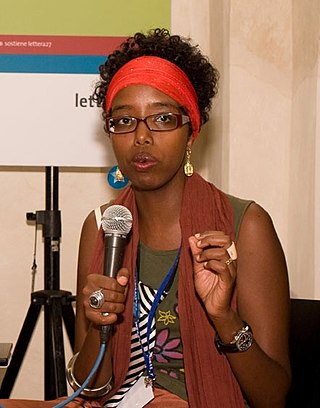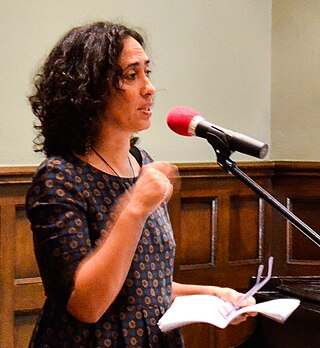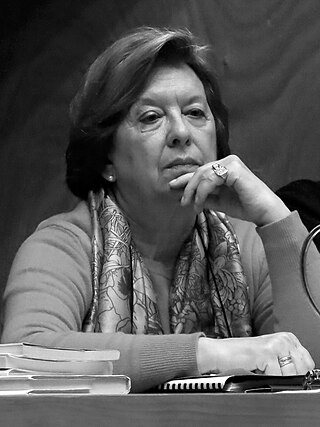Related Research Articles

Alberto Pincherle, known by his pseudonym Alberto Moravia, was an Italian novelist and journalist. His novels explored matters of modern sexuality, social alienation and existentialism. Moravia is best known for his debut novel Gli indifferenti and for the anti-fascist novel Il conformista, the basis for the film The Conformist (1970) directed by Bernardo Bertolucci. Other novels of his adapted for the cinema are Agostino, filmed with the same title by Mauro Bolognini in 1962; Il disprezzo, filmed by Jean-Luc Godard as Le Mépris ; La noia (Boredom), filmed with that title by Damiano Damiani in 1963 and released in the US as The Empty Canvas in 1964 and La ciociara, filmed by Vittorio De Sica as Two Women (1960). Cédric Kahn's L'Ennui (1998) is another version of La noia.

Dario Bellezza was an Italian poet, author and playwright. He won the Viareggio, Gatto, and Montale prizes.

Sandro Veronesi is an Italian novelist, essayist, and journalist. After earning a degree in architecture at the University of Florence, he opted for a writing career in his mid to late twenties. Veronesi published his first book at the age of 25, a collection of poetry that has remained his only venture into verse writing. He has since published five novels, three books of essays, one theatrical piece, numerous introductions to novels and collections of essays, interviews, screenplays, and television programs.

Igiaba Scego is an Italian writer, journalist, and activist.
Tahar Lamri is an Algerian writer.
INTERSOS is an international humanitarian organization, based in Italy, which intervenes in emergencies and crises to bring immediate aid to people whose lives are threatened by conflict, violence, extreme poverty, and natural or artificial disasters.

Dagmar Reichardt is a leading German scholar in the area of transcultural studies.

Luce d’Eramo was an Italian writer and literary critic. She is best known for her autobiographical novel Deviazione, which recounts her experiences in Germany during World War II. D’Eramo's writings are characterized by interest toward controversial subjects and a search of solutions that would liberate people from physical and mental constraints.
Fatima Ahmed is an Italian-Somali writer.
Caterina Bonvicini is an Italian writer. She was the recipient of the Rapallo Carige Prize for L'equilibrio degli squali in 2008. Her work has been translated into French.

Giorgio Ficara is an Italian essayist and literary critic. He is Full Professor of Italian Literature at the University of Turin.

Chiara Valerio is an Italian author and essayist.
Alice Ceresa was a Swiss writer.

Gabriella Ghermandi is an Italo-Ethiopian writer and performer. Ghermandi's writing focuses on the intersection of African and Italian identity.
Mario Benedetti was an Italian poet. He was among the founders of the contemporary poetry magazines Scarto minimo and Arsenal littératures.

Claudia Durastanti is an Italian writer and translator.

Francesco Salata was a Dalmatian Italian senator, politician, journalist, historian and writer. Salata was an irredentist, although he had a more legalistic approach than other contemporaries, as well as being more liberal. He was panned and attacked by the fascists, although, after they took power, he was employed by the fascist government, and wrote books apologizing for the fascist politics. Very fond of his native Istria, Salata opposed what he saw as the slavicisation carried out by Croatian priests in Istria, the Kvarner and Dalmatia. He accused the Slovenian and Croatian clergy of carrying out the slavicisation of Istria and the Kvarner. Salata upheld the idea that Dalmatia, Istria and the Kvarner were, historically, Italian lands.

Saveria Chemotti is an Italian writer of non-fiction and prose. She is an essayist, novelist, and literary critic, as well as a researcher with a focus area of culture and gender studies.
Marianna Pia "Maria" Villani Scicolone is an Italian television personality, columnist and singer.
Giorgio Amitrano is an Italian Japanologist, translator and essayist, specializing in Japanese language and literature.
References
Citations
- 1 2 "Ingy Mubiayi Kakese" (in Italian). Rome, Italy: Apollo 11. Archived from the original on 10 May 2017. Retrieved 20 February 2016.
- ↑ Camilotti, Silvia (February 2010). "Intervista a Ingy Mubiayi Kakese" (in Italian). Rome, Italy: Storie Migranti. Retrieved 20 February 2016.
- 1 2 "Ingy Mubiayi Kakese". Universidad de León, León, Spain: Encyclopedia of Afro European Studies. Retrieved 20 February 2016.
- ↑ Armelli, Paolo (27 April 2015). "Gli immigrati siamo noi. Storie di seconde generazioni e nuovi Italiani". Wired (in Italian). Rome, Italy. Retrieved 20 February 2016.
- ↑ Lombardi-Diop & Romeo 2012, p. 228.
- ↑ "Mubiayi, Ingy" (in Italian). Trento, Italy: Il Gioco degli Specchi. 2009. Retrieved 20 February 2016.
- ↑ Brioni, Simone (2016). "Igiaba Scego". London, England: Institute of Modern Languages. Archived from the original on 3 May 2016. Retrieved 20 February 2016.
- 1 2 "Venerdì 8 maggio la presentazione del libro 'Parole migrate' di Ingy Mubiayi Kakese" (in Italian). Capannori, Italy: Comune di Capannori. 6 May 2009. Retrieved 20 February 2016.
- ↑ "Fuori casa" (in Italian). Rome, Italy: Nuovi Argomenti. Retrieved 20 February 2016.
Sources
- Lombardi-Diop, Cristina; Romeo, Caterina (6 December 2012). Postcolonial Italy: Challenging National Homogeneity. New York, New York: Palgrave Macmillan. ISBN 978-1-137-28147-0.